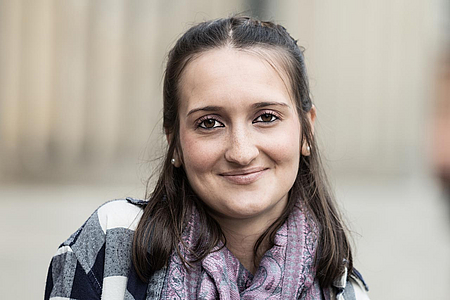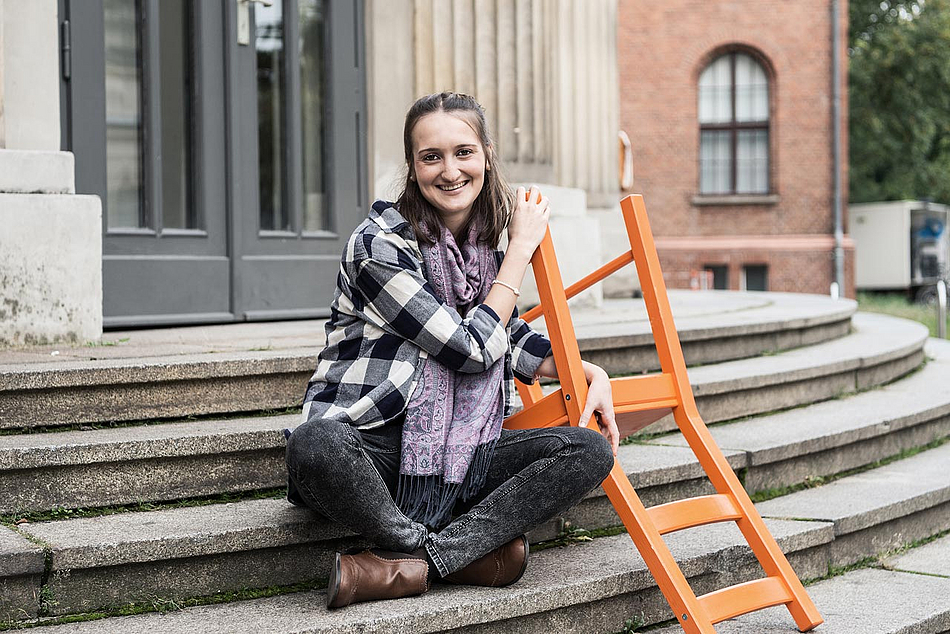The perfect connection
Philine Köln has already wanted to work as a doctor for half her life – and not just because she comes from a medical family. She got the idea after she was very ill as a child and had to spend a lot of time in hospital. “That was a difficult time, but I was on a ward with well-qualified, kind doctors and great nursing staff. Thanks to them, I have a very positive memory of that time. It awakened a desire in me to follow in their footsteps one day.”
Today, Philine Köln is very close to realising that goal. The young Berliner is 24 years old and is just finishing her studies at the Charité. To her, medicine is simply the perfect combination of natural sciences and a big social component, in which there’s no real routine and it’s never boring. At present, she works in the Internal Medicine department of the clinic in Urban, in the middle of Berlin-Kreuzberg, and is completing part of her practical year there.
The thing Philine Köln appreciates about the model study program at the Charité is that it breaks with the old patterns – first theory, then practice – and instead already links the basics to the practice at the clinic. „The thought of first having to dryly study all the natural sciences for two years after leaving school didn’t strike me as being particularly enticing,” relates Philine Köln. “At the Charité, right from the start, I had the opportunity to be present when patients were being treated. I like this extremely close, continuous connection with what will now be my everyday work during my practical year, and of course even more so after graduating from my studies. Apart from that, it also gave me a sense of certainty much earlier on that I had made the right decision in my choice of studies.” And sitting opposite Philine Köln, you immediately get the feeling that that decision was the right one.
She recently worked in Medellín for several months. She explains that the technical facilities in this hospital in the heart of Columbia hardly differ from those in Germany.
“Although the interaction within the team was different, with flat hierarchies and a family atmosphere,” as she sums up her experience there, “You could talk to the professors and experienced doctors at any time with no problem.” She says that she benefited a great deal from that openness and the kindly feedback and was able to learn an incredible amount during that time.
In a few months, Philine Köln wants to complete her studies. Listening to what she has to say, it’s clear that she will continue to be guided by her empathy for patients and her fascination for the transformation occurring in medicine. “Ten years ago, many things that are a matter of course today weren’t even possible yet,” she explains.

Funding program
Deutschlandstipendium
Funding period
Since 2015
Research area
Human medicine
Institution
Charité – Universitätsmedizin Berlin
Since 2015
Scholarship holder of a Deutschlandstipendium financed by Stiftung Charité
Since 2011
Medical degree, Charité – Universitätsmedizin Berlin
2011
Abitur (German high school diploma)
In her view, this also applies to the future: “Today too, you come up against limits time and again as a doctor, because the diseases are so complex or so rare, or because we quite simply still have no way of treating them.” Which is why she can well imagine a future career in a university clinic – close to medical research. The specialization which she is currently considering is Hematology and Oncology. “I’m never going to get to a point where I can say: ‘Now I know it all.’ There’ll always be more, and always new, things to learn. That’s what’s so marvelous about medicine and also commands my great respect time and again.” There’s no doubt that Philine Köln has chosen the right profession.
June 2017 / TO
